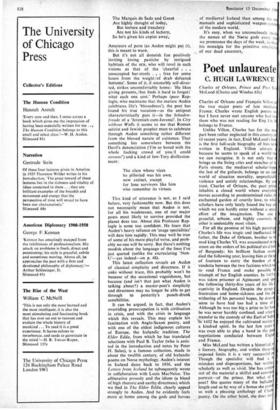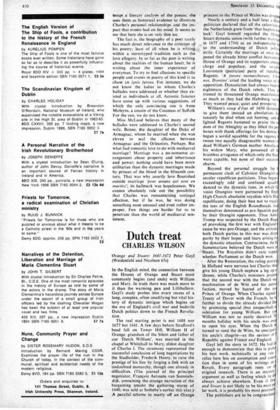Poet unlaureate
C. HUGH LAWRENCE
Charles of Orleans, Prince and Poet E McLeod (Chatto and Windus 63s) Charles of Orleans and Francois Villon a the two major poets of late mediae% France. Charles wrote English poems t but I have never met anyone who had r them who was not reading for Eng Lit. belongs to France.
Unlike Villon, Charles has for the m part been rather neglected in this country u til recent years; in fact, Enid McLeod's b is the first full-scale biography of him to written in England. Villon attracts because he seems to speak of a world t we can recognise. It is not only that brings us the living cries and stenches of t Paris streets; the mediaeval scholar-hip the last of the goliards, belongs to an o world of situation morality, unpredicta violence and untidy relationships. By c' Oast, Charles of Orleans, the poet pri inhabits a closed world where everythi moves according to predetermined rules, t enchanted garden of courtly love, to whi' scholars have only lately found the key a which we can hardly enter without a sped effort of the imagination. The one graceful, urbane, and highly courtois; other is undeniably most vilain.
For all the promise of his high parents Charles's life was tragic and ineffectual. father, the Duke of Orleans, brother to mad king Charles VI, was assassinated in street on the orders of his political rival J' of Burgundy; his brilliant Italian mot died the following year, leaving him at the of fourteen to carry the burden of vendetta between the two factions which s to rend France and make possible triumph of her English enemies. In 1415 was taken prisoner at Agincourt and s the following thirty-five years of his life captivity in England. Despite the pangs frustration and home-sickness and the withering of his personal hopes, he does seem to have bad too bad a time of Although he was too big a prize to let 1 he was never harshly confined, and after transfer to the custody of the Earl of Suit In 1432 he enjoyed the cultivated society a kindred spirit. In the last few years was even able to play a hand in the negotiations conducted between Engle and France.
Miss McLeod has written a historical. a literary, biography, and within these imposed limits it is a very successful Though the specialist will find a mistakes and disproportions, her writing scholarly as well as vivid. She has cola out of the material a skilful and cony] portrait—of the prince. But what of poet? She quotes many of the ballade length and so by way of a bonus she pro' us with a pleasing anthology of Ch• poetry. On the other hand, she does not
I
tempt a literary analysis of the poems; she uses them as historical evidence to illustrate Charles's personal relationships and the im- pact that events had on his mind. It seems to me that here she is on very thin ice.
The fact is, the biography of a poet rarely has much direct relevance to the criticism of his poetry; least of all when he is writing within a stereotyped tradition such as the love allegory. In so far as the poet is writing about the realities of the human heart, he is writing about the inner experience of everyman. To try to find allusions to specific people and events in poetry of this kind is to chase an ignis fatuus. For instance, we do not know the ladies to whom Charles's ballades were addressed or whether they ex- isted as individuals at all. Acrostic fanatics have come up with various suggestions, of which the only convincing one is Anne Moleyns, a cousin of the Countess of Suffolk For the rest, we do not know.
Miss McLeod believes that many of the ballades were addressed to Charles's second wife, Bonne, the daughter of the Duke of Armagnac, whom he married when she was eleven to seal the alliance between Armagnac and the Orleanists. Perhaps. But what had romantic love to do with mediaeval marriage? Marriage was a no-nonsense ar- rangement about property and inheritance and power; nothing could have been more utilitarian than the dynastic marriages made by princes of the blood in the fifteenth cen- tury. That was why courtly love flourished outside marriage 'pour amans qui sons en martire; its hallmark was hopelessness. We cannot absolutely rule out the possibility that Charles was romanticising conjugal affection, but if he was, he was doing something most unusual and even rather im- proper. Few things are harder for us to penetrate than the world of mediaeval sea- timent.















































 Previous page
Previous page